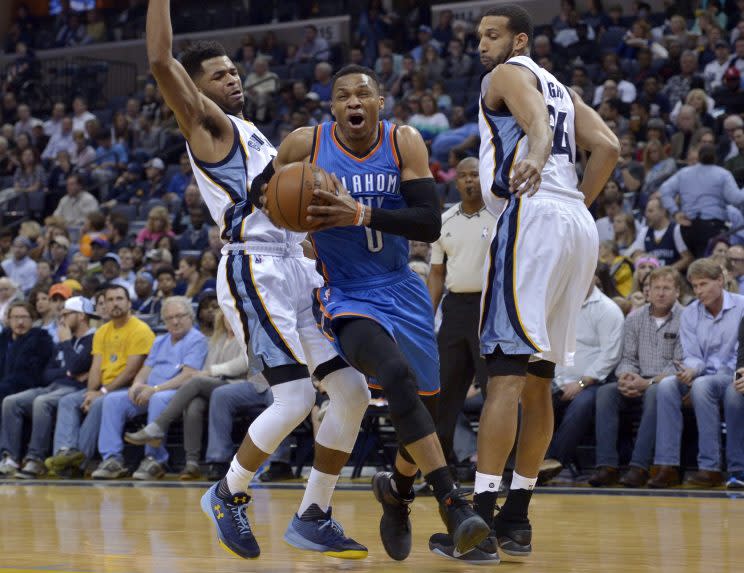Russell Westbrook didn't get his historic triple-double vs. Memphis, but what he did was way better

Russell Westbrook’s historic 2016-17 season has been discussed largely in terms of his statistics. That’s perfectly understandable and not surprising, because the Oklahoma City Thunder is putting up triple-double numbers we haven’t seen in 55 years.
He entered Wednesday night’s game at the Memphis Grizzlies needing just one more triple-double to pass Oscar Robertson for the single-season record, 16 more assists to clinch a triple-double average for the season, and two straight triple-doubles to match Wilt Chamberlain’s record of nine in a row. These stats are mind-boggling, and still do not even encompass the totality of Westbrook’s record-breaking achievements.
[Sign up for Yahoo Fantasy Baseball: It’s not too late to get in the game]
Yet the excitement over Westbrook’s campaign has never really been about the triple-doubles, which became clear during OKC’s dramatic 103-100 win at FedEx Forum. Westbrook didn’t get his historic triple-double, fell short of that 16-assist milestone, and saw his streak end at seven games. Regardless, he was unquestionably the best player on the floor and did everything imaginable to help the Thunder win. Who needs a triple-double when a performance offers so much?
If you're wondering, Westbrook has had seven games this season where he's been either a rebound or assist short of a triple-double.
— Royce Young (@royceyoung) April 6, 2017
Of course, Westbrook wasn’t exactly lacking statistically. OKC’s do-everything guard put up an efficient 45 points (14-of-25 FG, 8-of-13 3FG, 9-of-12 FT), 10 assists, nine rebounds, and five steals in 38 minutes. His eight triples matched a career high, and just one of his seven turnovers came in a tight fourth quarter.
With that statistical recitation out of the way, let’s move on to what made Westbrook’s night so thrilling. Apart from falling one rebound short of the triple-double record, Westbrook grabbed everyone’s attention by completely taking over the game. When he reentered with 9:33 remaining in regulation, the Thunder led 82-79. Two Grizzlies 3-pointers turned that into a three-point deficit after a little more than a minute, but from that point on, Westbrook scored or assisted on all but five of OKC’s final 24 points, and on everything after a Doug McDermott 3 that regained the lead with 5:45 left.
That stretch included three huge plays in the final 90 seconds — an amazing dribble to find McDermott for a tie-breaking 3-pointer late in the shot clock, a dagger three-pointer with 14 seconds left, and the game-cinching steal on the next possession. Westbrook also made two free throws with fractions of a second left to put his finishing touches on the final score.
As usual, the results weren’t half as exciting as the way Westbrook went about his business. No player seems to feed off his own chaotic style like the Thunder superstar, and the great plays he made were arguably more impressive because of what things looked like when he failed. His two late 3-pointers sandwiched a truly terrible fadeaway midrange jumper that went off the side of the backboard, and with several minutes left, it looked as if Westbrook was just as likely to win it for OKC as he was to go down in a blaze of ill-advised fouls 93 feet from the basket.
[Follow Ball Don’t Lie on social media: Twitter | Instagram | Facebook | Tumblr]
Basketball fans are used to seeing Westbrook shoot on every possession and run at opposing ballhandlers for unlikely steals in the final possessions, but on Wednesday he seemed to do it on every possession of the last nine minutes. There is no precedent for this style in recent NBA history, and trying to sum it up in a few paragraphs and a stat line feels woefully inadequate. The sheer amount of activity is astounding and exhausting for the viewer, let alone the players on the floor. Westbrook has been accused of hunting triple-doubles in several games this season, and there’s certainly some truth to the claim. Much more often than not, though, his ridiculous stat lines feel more like byproducts of the way he plays than the goal. He logs triple-doubles because he has a pathological need to be around the ball.
I don’t know if Russell Westbrook will be Most Valuable Player and don’t especially care. No matter what happens in award voting before the playoffs, he will be remembered by those who saw him as the most dominant player of the 2016-17 season. His place on an awards list means far less than the shock and awe of the experience itself.
– – – – – – –
Eric Freeman is a writer for Ball Don’t Lie on Yahoo Sports. Have a tip? Email him at efreeman_ysports@yahoo.com or follow him on Twitter!



